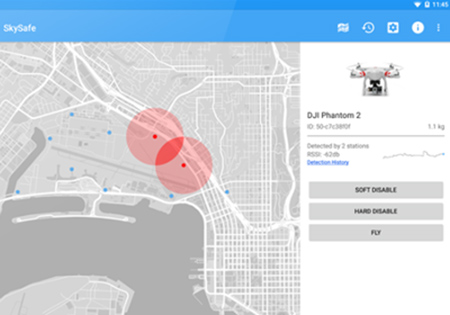
Former Cyber Security Grad Students Seal $3 Million Deal for Drone Security Venture
Published Date
By:
- Doug Ramsey
Share This:
Article Content

CEO Grant Jordan is a former M.S. student in the security group of Computer Science and Engineering professor Stefan Savage.
Grant Jordan and Paul Wicks (M.S. ’14) are former students in the Master's program in Computer Science and Engineering at the University of California San Diego. In 2015, they co-created a security-related company called SkySafe to protect organizations from illegal or dangerous incursions from commercial drones and their owners. Now, one of the top venture-capital firms in Silicon Valley, Andreessen Horowitz, has agreed to lead a $3 million investment in the fledgling company.
After earning his undergraduate degree in computer science at MIT and testing anti-drone technology at the Air Force Research Lab, Jordan enrolled at UC San Diego to focus on computer security and its potential. While working in the lab of CSE Prof. Stefan Savage, Jordan and Wicks co-founded their first startup -- an IT-security consulting firm called Somerset Recon. But with the rapid proliferation of commercial drone technology, it became clear that airspace security offered a huge potential market if Jordan and Wicks could come up with the right solution.

SkySafe interface for tracking errant drone devices in airspace on behalf of public-safety organizations such as airports, stadiums and critical infrastructure.
"I think security is one of the most exciting and diverse areas of computer science," said SkySafe CEO Jordan in the wake of the April 19 funding announcement. "It cuts across all other research areas and every project is new. What other area lets you work on such diverse subjects as spam, underground economies, Bitcoin, Internet of Things devices, and drones, all in the course of just a few years?"
In a nutshell, SkySafe has developed technology that will allow institutional users to disable drones flying in areas that are off-limits, or those in accessible areas that may be flying dangerously. The technology leverages radio waves to override the instructions from a drone owner's remote control unit, thus taking control of the airborne device.
In an article posted on LinkedIn late last week, Jordan noted that there have been no effective tools to control airspace and protect people and places from drone threats. "Our goal is to help drones be a positive change in society, by improving safety, management and coordination," he said. "We're building the tools to let facilities properly control and protect their airspace. Our system detects, identifies, tracks and takes action when needed... to secure the area, allowing the safe operation of authorized drones and stopping dangerous ones."
In an interview with TechCrunch, Jordan also noted that, "Between that security work and [my] drone work, we saw a growing threat in the drone space." He added that SkySafe is initially targeting organizations such as "airports, prisons, stadiums, other event venues, border protection, critical infrastructure.”
Added Jordan: “The number of places that have seen incidents in the past year has grown tremendously."
According to the SkySafe CEO, being part of Stefan Savage's security research group was an important stepping stone to SkySafe. "Stefan Savage made an incredible impact on my interest in cyber security," he explained. "He's such an incredibly engaging, insightful, and creative thinker. I was incredibly lucky that he took an interest in me and invited me to work on his team; I couldn't have found a more awesome research group."
SkySafe is currently inviting partnerships or test deployments of its drone security system, and the company has plans to launch SkySafe in the second half of 2016, initially to qualified public-safety customers.
Share This:
You May Also Like
Stay in the Know
Keep up with all the latest from UC San Diego. Subscribe to the newsletter today.


